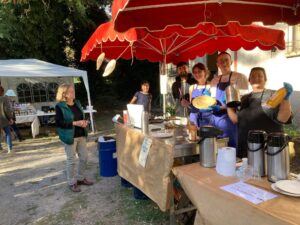Written by Silia Schanz, VEFA 2021-22 – Edited by Bianca Rêgo, ESC Wake-Up 2022-23
Fermentation is the process of turning components of a food into acids or alcohol by feeding bacteria, yeast or fungi with carbohydrates.

Health benefits
- Low in calories because sugars are broken down by the bacteria
- Lots of vitamins
- Probacteria: helps restore the balance of friendly bacteria in the gut
- Easy food to digest
- Improvement of the availability of nutrients increases because the fermentation breaks down components that are hard to digest
- Many more benefits
Nutritional Values of Sauerkraut

Recipe for fermenting Sauerkraut
- Shred cabbage into thin stripes and leave the strung out.
- Add salt (about 2-3% of the mass of shredded cabbage).
- Let it sit until some fluid leaves the cabbage (20 min) or just start with kneading.
- Knead with your hands until there is water coming out and cabbage stripes are soft.
- Fill into a sterile jar to the top. It should be covered by liquid entirely.
- You can put on top of the cabbage one of the green leaves in the shape of the opening of the jar. Press it with a stone or marbles so that the cabbage stripes are densely pressed in the jar.
- Let it ferment for at least 7 days and up to 21 days.
- To stop the fermentation process, put the jar in the fridge.
As lactic acids are natural preservers, your Sauerkraut will last for years.

Serve together with the German Schupfnudeln.
Put it as a side dish, salad, dip, salsa, soup, on burgers, sandwiches and hotdogs…







